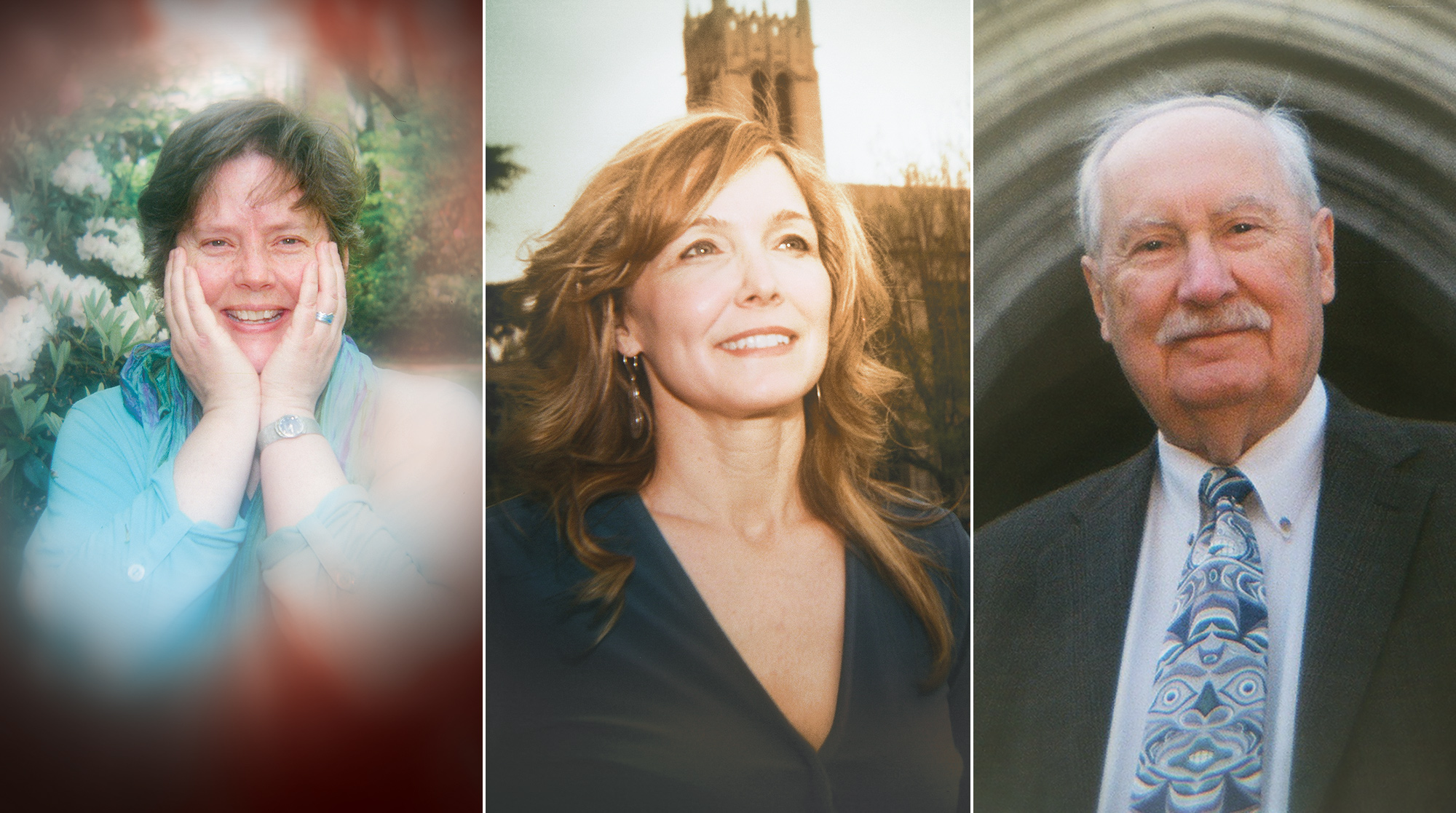

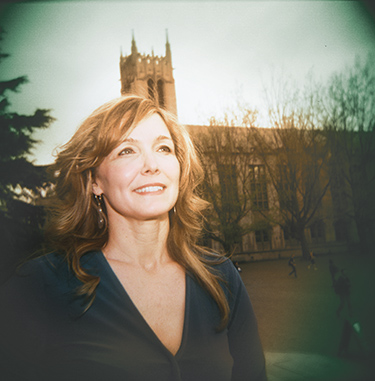 Ellen Moore,
Ellen Moore,What was your biggest surprise as a teacher?
My biggest surprise as a teacher was at UW Tacoma during my first quarter teaching. When I was on my way to an event downtown, I stepped on our light rail, and much to my surprise, there was one of my best students: he was a security guard for the train! He told me that he was married and had children, and he knew how important an education was so that he could support his family. I never looked at my students the same way after that, knowing their lives outside of campus.
What kind of a student were you?
I was not a great student at first, but one day I had two realizations: first, that my major at the time wasn’t exciting me, and second, that I loved archaeology! I switched my major, and started getting all A’s. I think this explains why I am so hard on my students: I want them to “wake up” earlier than I did, and immerse themselves in learning about things that matter to them.
What was your most frightening classroom moment?
I was teaching Children and Television in a large auditorium-style classroom when we heard and felt a “boom!” that shook the walls of the room. We hustled outside, only to find out that Obama was coming into town, and his security jets had just flown by and broken the sound barrier.
What, if anything, has gotten easier about teaching? What has gotten harder?
I find myself putting more of myself into my courses. As an example, I now offer extra review sessions for students right before the exam: the one last quarter was at 7 a.m., and almost every student showed! I hold writing workshops where students bring in their draft and I work with them so they can see weaknesses and strengths before they hand in their paper. When you truly invest yourself in student learning, you spend more time teaching, and you have to make room for that in your life in order to make that happen.
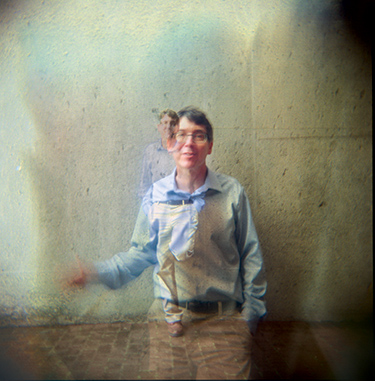 Daniel T. Schwartz,
Daniel T. Schwartz,What day as a teacher held your biggest surprise?
One of the biggest surprises was how quickly Native American student interest grew in our tribal energy research program. For example, our first research project with the Yakama Nation had no enrolled Yakama fellowship students. Two years after doing research on the Yakama reservation, we had five Yakama students in our program. I even got a telephone call from a prospective Yakama student on a military base in Iraq who had heard about our program from his mom.
What was the last book you read?
I recently read The Boys in the Boat on a long overseas flight. Once I picked it up at the airport, I was hooked, and could not put it down until it was finished.
What kind of student were you?
I learned (and still learn) best when working on tangible things, rather than abstract ideas. So, I was (and still am) into doing projects rather than homework. With homework, I can figure out how to identify and rearrange the right equation to get the right answer, but I too often miss the “big idea”. With projects, I can more easily see the “big idea” unfold as the bits and pieces of the project come together.
What was your most frightening classroom moment?
I had a student jerk, gasp, and pass out in class. This was before cell phones, so I sent another student running to find a phone and call 911. By the time medical assistance arrived, he was alert and wondering what happened. I went with him to UW hospital, a parent arrived, and everything turned out OK.
What, if anything, has gotten easier about teaching? What has gotten harder?
Top students, faculty, and external partners are keen to tackle the grand challenge of an affordable and scalable clean energy future, so as the reputation of the research and educational programs I lead have grown, it has become easier to blur the lines between research, teaching, and service to society. Fellowship funding has let us build student teams with participation from six of UW’s Colleges and Schools. Unfortunately, winning and sustaining federally funded fellowships has gotten progressively harder over the years.
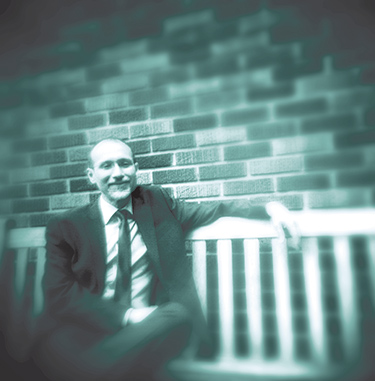 Chris Laws,
Chris Laws,What day as a teacher held your biggest surprise?
Surprises seem to occur to me all the time, and the university environment is built specifically to encourage discovery and surprise (or is that the whole universe doing that?). There are goofier unexpected moments, such as when I had a student turn in a homework assignment he had handwritten on a brown, public-bathroom style paper towel.
What was the last book you read?
The book I actually finished most recently is The Extraterrestrial Life Debate: Antiquity to 1915, edited by Michael J. Crowe; it’s a sourcebook of historical opinions on the subject of life on other worlds, from Leucippus and Democritus through Twain and Schiaparelli.
What kind of student were you?
Happy, excited, not-always-clearly-focused—I’ve always thrived in and loved the university environment, and have incredibly fond memories of my first four years at college earning a BS in psychology from LSU-Baton Rouge.
What was your most frightening classroom moment?
Leading student field trips out to the UW’s telescope at Manastash Ridge just outside of Ellensburg, on one particular trip one of the cars in our caravan left the road in a sharp curve and flipped. Fortunately no one was seriously injured, despite the fact that the vehicle landed on its topside, with the roof completely caved in on the students inside.
What, if anything, has gotten easier about teaching? What has gotten harder?
What has gotten easier about teaching is the steady increase in my self-confidence and the sense of freedom to experiment that I feel.
The clearest thing that has gotten harder is the rising level of student stress here at the UW. Today’s UW students face additional and growing challenges — higher loads of student debt and struggles to get into competitive majors weigh on student’s minds and sap their energy and enthusiasm in a way that has worsened in the last decade. That stress inevitably impacts their studies, and seems to occupy an increasingly prominent role in my advising and mentoring conversations.
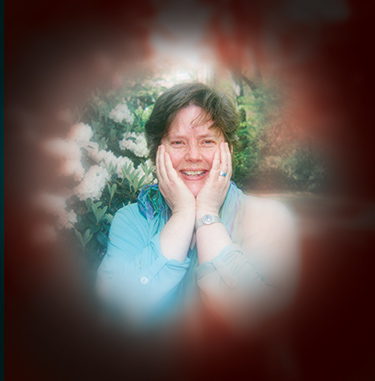 Taryn Lindhorst,
Taryn Lindhorst,What day as a teacher held your biggest surprise?
I have been surprised and moved by the depth of the connection we have been able to forge in the Carol LaMare program both among current students and those who have graduated. We recruit and train students interested in oncology and palliative care through a yearlong intensive training program which includes a specialized field placement and biweekly seminar. Each year, we have been able to recruit 6–8 students who want to specialize in this challenging area of work. This year marks the 10th anniversary of the scholarships, and the 5th anniversary of the seminar.
What was the last book you read?
Coercive Control by Evan Stark, a book about domestic violence which helps explain why abuse is so much more than a physical act, but rather a deprivation of women’s liberty. Stark’s book explains in plain language how women become entrapped by violent men, but also how women survive these terrifying situations and reclaim their own rights.
What kind of student were you?
Very serious! I had the opportunity to go on from my BA degree to get a graduate degree in linguistics back in the 1980’s. But instead, I finished college at WSU in a hurry because I wanted to get out into the “real world” and do something about real problems. And that is what led me to social work.
What, if anything, has gotten easier about teaching? What has gotten harder?
Over the years, it has become progressively easier for me to be more authentic in the classroom, both because of the support I have received in my department and because of my own increasing confidence as a teacher.
The thing that has gotten harder over the years has been the degradation of institutional and structural supports for students and teaching. The budget cuts of the last several years have meant that students going into social work are carrying an ever-increasing debt to income ratio, so almost all students are working in addition to being in school.
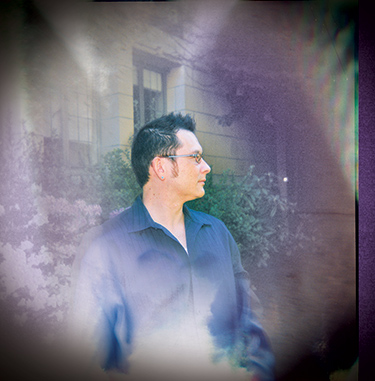 Wayne Au,
Wayne Au,Who was your favorite teacher? Why?
I had two favorite teachers, both at Garfield High School in Seattle. One was Craig MacGowan, who taught marine biology. Mr. MacGowan both made me want to be a teacher (which I did become) and a marine biologist (which I didn’t). The other was Gary Davis, who taught Language Arts and History. Mr. Davis’s classes taught me about the politics of knowledge and how important curriculum is in shaping the way students understand the world.
What day as a teacher held your biggest surprise?
I think I’ve more been enthralled with the ongoing, smaller surprises – like when students surprise themselves, when they “get” something, when I see students really doing the difficult emotional and conceptual work that is behind real learning.
What was the last book you read?
For guilty pleasure I think it was Carl Hiaasens’ last novel, Skink-No Surrender. In terms of my scholarship and professional reading, probably Jodi Melamed’s Represent and Destroy: Rationalizing Violence in the New Racial Capitalism.
What kind of student were you?
If I could have some control over what I was learning and could make important connections to the real world, I was a “good” student. If not, I would trudge and sometimes be a slacker.
What was your most frightening classroom moment?
I’ve worked a lot with youth as a high school teacher, in an alternative public school for dropouts, to large comprehensive programs. Violence – having to physically break up fights, intervening with kids who wanted to do violence to themselves, or dealing with the threat of weapon violence—has been the most frightening experience.
What, if anything, has gotten easier about teaching? What has gotten harder?
I think it has gotten easier mostly in terms of understanding my students in a general sense. The draconian, corporate education reforms that have taken over K-12 schools are steadily seeping into our teacher education programs nationwide. This has created a feeling of distrust in our work as professionals, and it has started to shape the ways we have to structure our curriculum – none of which are healthy for good teaching and learning.
 Emily Pahnke,
Emily Pahnke,Who was your favorite teacher? Why?
My favorite teacher was a calculus professor in college. He asked questions like “how could you heat this house for the winter” and then showed us how to integrate and apply our math and science training to solve real-world problems.
What day as a teacher held your biggest surprise?
Other than getting the call about this award?
What were a few of the last books you read?
Flash Boys by Michael Lewis and Yes, Please by Amy Poehler
What kind of student were you?
I liked school, but had to work hard at it. In college I followed some excellent advice to take a fun course every semester. That provided a lot of perspective and is where I made lasting friendships.
What was your most frightening classroom moment?
Nothing has been as frightening as the dreams that every teacher has about showing up on the first day and having forgotten the syllabus, lecture slides etc.
What, if anything, has gotten easier about teaching? What has gotten harder?
Understanding how to best structure an entire course and then each day of instruction has gotten easier.
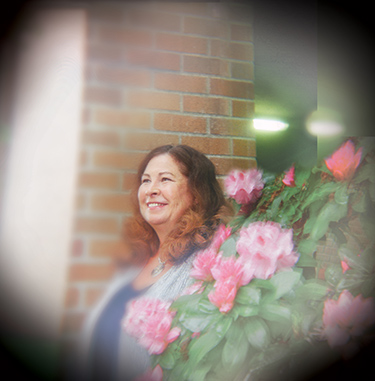 Leta Beard,
Leta Beard,Who was your favorite teacher?
Although I have been fortunate to have been taught by a number of excellent teachers and professors, the person who stands out is Professor Emeritus Doug (Mac) MacLachlan in the Foster School of Business. Professor MacLachlan exemplified how one committed teacher can make a difference in his students’ lives. Mac was my professor in graduate school, my department chair when I started teaching as a TA and again as I started teaching full time. Not only was he an outstanding professor but he was my mentor and friend.
What day as a teacher held your biggest surprise?
Students are full of surprises especially when it comes to excuses for a missed class or test. At the top of my list was one student who managed to miss the last three weeks of class but showed up to take the final exam. After inquiring where he had been, he had quite a story to tell. It turned out he had made it to the final round of the national “Texas Hold’em” tournament. Lucky in cards but not so lucky in marketing!
What was the last book you read?
When I read for pleasure, it is usually fiction. Over spring break I read John Grisham’s Sycamore Row.
What was your most frightening classroom moment?
Easily my first day of teaching at the University. I had never taught before and was terrified. Although the class was only an hour and a half, I had enough material prepared to teach an eight-hour class!
What, if anything, has gotten easier about teaching? What has gotten harder?
Teaching has become somewhat easier in sorting out and filtering what is important and not so important in presenting course material. I am okay with not finishing my prepared lecture if the students are actively involved in a class discussion.
What has become more challenging is keeping this new generation of tech savvy students fully engaged in the classroom. The days of flipping transparencies and just lecturing are long gone. Although my class size is large, I do a lot of experiential learning activities in the classroom. I am constantly breaking up the class into smaller segments for learning exercises. I want my students to use their critical thinking skills in class. I also try to create a learning environment that encourages everyone to feel safe to share their viewpoint.
What type of student were you?
Coming from a family of educators, I took school seriously. I wasn’t the smartest student in the class but worked very hard to excel. I rarely missed class and almost always sat in the front row raising my hand to answer the professor’s questions. For some, this is known as a “front row gunner”! I was also very active in several organizations on campus. As an undergraduate, I was treasurer of the marketing club, my sorority, and vice president of the business honorary. As a graduate student, I was president of the MBA Association. I am proud to be a member of Phi Beta Kappa and Beta Gamma Sigma (the business honorary).
 Jerry F. Franklin,
Jerry F. Franklin,What do you find most useful as a teacher?
The one consistent element of my teaching is getting my students into the field. The best way to learn about the forest is to get out in the forest. Every year I have a two-week field trip before the fall quarter. It’s a camping trip. The students absolutely love that. They talk about it as one of their most important experiences in college.
What was the last book you read?
The last book that I read was Flash Points by George Friedman and currently reading Crucible of Command by William C. Davis.
What kind of student were you?
I was a mediocre student in secondary and high school but my experiences in college really turned me on (structure was much more appropriate to my nature). Once I got involved in forest science and management it was a case of total immersion.
What was your most frightening moment?
I only came to full time teaching as a professionally mature individual with a lot of experience in research, presentation, etc. Also, most of my best teaching occurs in field environments, rather than a classroom, where the most frightening moments are likely to be appearance of a bear or a tree falling.
What, if anything, has gotten easier about teaching? What has gotten harder?
My sense is that teaching has gotten easier for me as I have increasingly understood what I have to offer students. Also, the average quality (interest level, commitment, literacy, etc.) of the students with whom I have been in contact has definitely improved over the last decade.
The first decade I taught at the UW there was a really strong interest in making money. Now the students are a more thoughtful group. I don’t see them being strongly polarized in their perspectives. They seem to be more open to alternative ways of thinking about things.
What do you do for fun?
I go hiking in the woods. Fun for me is a pack trip into the Glacier Peak Wilderness.
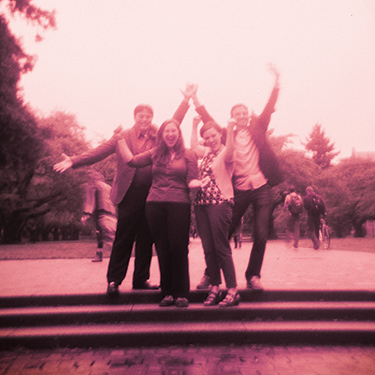 Distinguished Teaching Award for Innovation and Technology
Distinguished Teaching Award for Innovation and TechnologyChemistry faculty: not only do they know their molecules but they sure know how to celebrate. Four young members of the department (listed from left to right) can’t contain their joy on a drizzly day in the Quad.